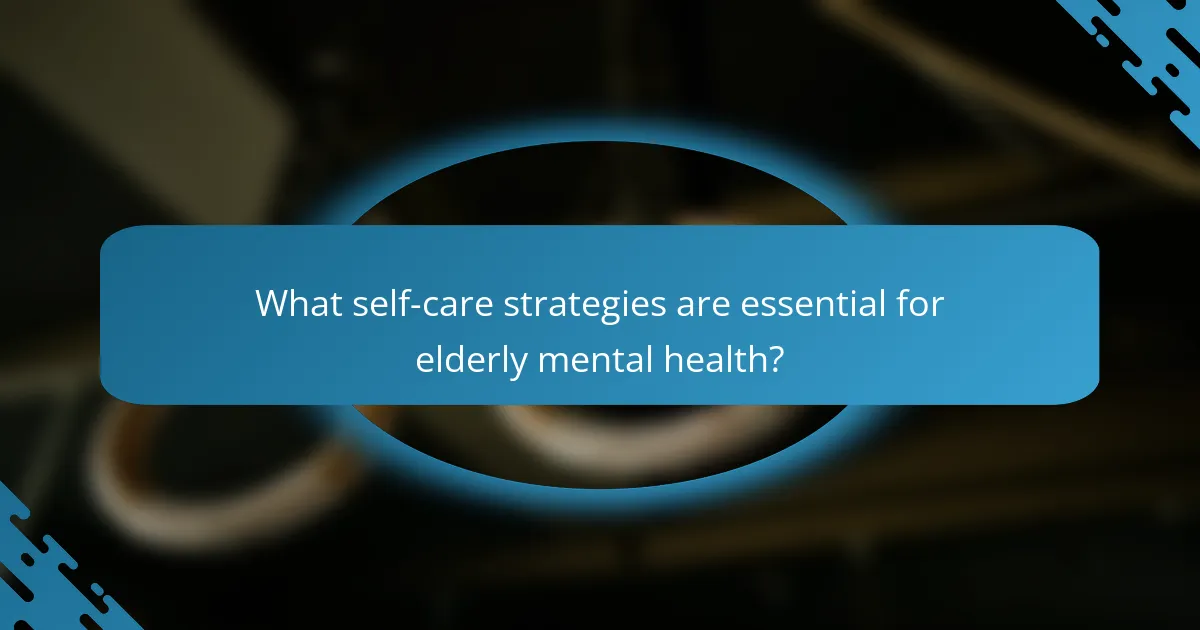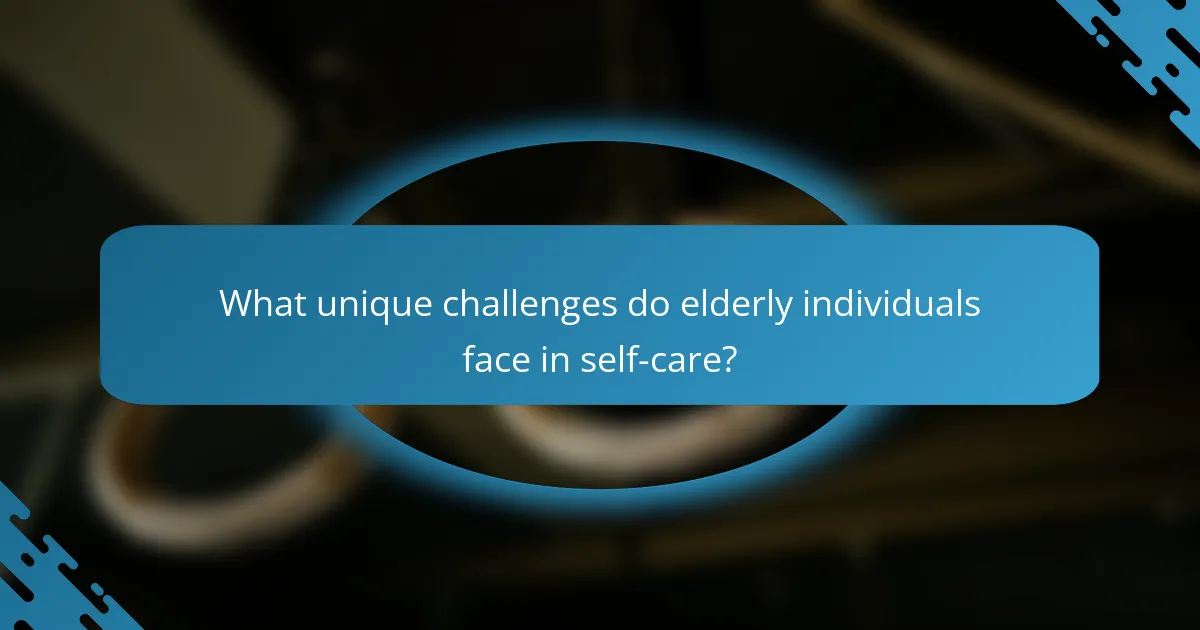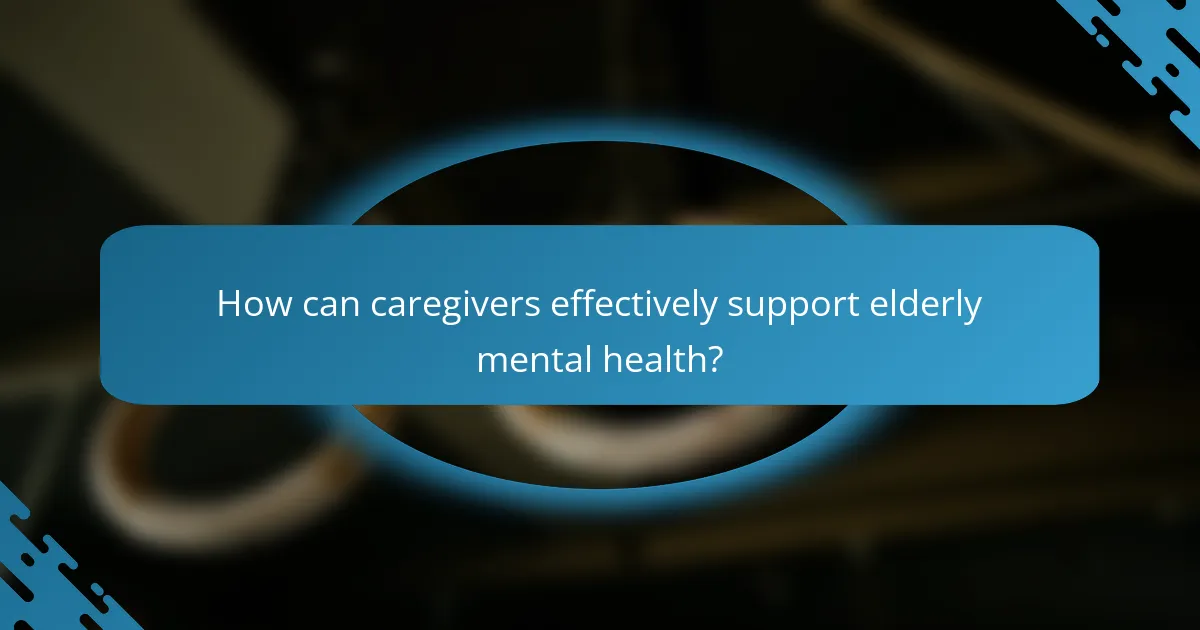Enhancing mental health in the elderly is essential for improving their quality of life. Love fosters emotional support and reduces loneliness, while self-care strategies like social engagement, physical activity, and mindfulness practices promote overall well-being. Addressing unique challenges faced by the elderly is crucial for effective self-care. Caregivers can play a vital role by encouraging meaningful relationships and tailored routines that support mental resilience.

What is the role of love in enhancing mental health for the elderly?
Love plays a crucial role in enhancing mental health for the elderly by fostering emotional support and reducing feelings of loneliness. Strong relationships contribute to lower levels of depression and anxiety, promoting overall well-being. Engaging in loving interactions can stimulate the release of oxytocin, a hormone that enhances mood and social bonding. As a result, elderly individuals with strong connections tend to experience greater life satisfaction and improved cognitive function. Prioritising love in their lives can lead to significant mental health benefits, making it an essential strategy for self-care in this demographic.
How does emotional support impact well-being?
Emotional support significantly enhances well-being by fostering feelings of love and connection. It reduces stress, increases resilience, and promotes a sense of belonging, all crucial for mental health in the elderly. Studies show that social interactions can lower the risk of depression and anxiety, improving overall life satisfaction. Furthermore, emotional support can lead to better coping mechanisms during challenging times, reinforcing the importance of nurturing relationships in later life.
What are the different forms of love that benefit seniors?
Different forms of love that benefit seniors include familial love, romantic love, friendship, and community love. Each form enhances emotional well-being and reduces feelings of isolation. Familial love provides support and security, while romantic love can rekindle joy and companionship. Friendship fosters social engagement, and community love encourages participation in group activities. These connections are vital for mental health in the elderly.
How can familial love strengthen mental resilience?
Familial love significantly enhances mental resilience by providing emotional support and a sense of belonging. This bond fosters positive mental health outcomes in the elderly, reducing feelings of loneliness and depression. Studies indicate that strong family ties correlate with lower stress levels and improved coping mechanisms. As a result, elderly individuals who experience familial love often report higher life satisfaction and better overall mental health.
What role do friendships play in emotional health?
Friendships significantly enhance emotional health by providing support, reducing loneliness, and fostering a sense of belonging. Social interactions stimulate positive emotions and can lower stress levels. Studies show that strong friendships in the elderly correlate with improved mental well-being and longevity. Engaging in meaningful relationships helps combat isolation, a common issue among seniors, promoting resilience and overall happiness.

What self-care strategies are essential for elderly mental health?
Essential self-care strategies for elderly mental health include social engagement, physical activity, and mindfulness practices. These strategies foster emotional well-being and cognitive function.
Social engagement helps reduce feelings of isolation, enhancing overall happiness. Regular physical activity, even light exercises, improves mood and physical health. Mindfulness practices, such as meditation, promote relaxation and reduce anxiety.
Incorporating hobbies and interests can also provide joy and a sense of purpose. Prioritising sleep hygiene and maintaining a balanced diet are vital for mental clarity and emotional stability.
These strategies collectively support the unique mental health needs of the elderly, promoting a higher quality of life.
How can physical activity improve mental well-being?
Engaging in physical activity significantly enhances mental well-being among the elderly. Regular exercise reduces symptoms of anxiety and depression, promoting a positive mood and cognitive function. Studies show that even moderate activity, such as walking, can lead to improved self-esteem and social interaction. Furthermore, physical activity fosters a sense of routine and purpose, essential for mental health in older adults.
What types of exercises are most beneficial for seniors?
Regular exercises such as walking, swimming, and strength training are most beneficial for seniors. These activities enhance physical health and mental well-being. Walking improves cardiovascular health and mobility, while swimming offers low-impact resistance training. Strength training helps maintain muscle mass and bone density. Incorporating balance exercises reduces fall risk, promoting independence. Engaging in these exercises can lead to improved mood and cognitive function, essential for mental health in the elderly.
What dietary changes support mental health?
Dietary changes that support mental health in the elderly include increasing omega-3 fatty acids, antioxidants, and whole grains. Consuming fatty fish, berries, and nuts can enhance cognitive function and mood. A Mediterranean diet, rich in fruits, vegetables, and healthy fats, is linked to lower depression rates. Regular intake of vitamins B, D, and magnesium also plays a crucial role in mental well-being.
Which nutrients are crucial for cognitive function?
Nutrients crucial for cognitive function include omega-3 fatty acids, antioxidants, B vitamins, and vitamin D. Omega-3s support brain structure and function, while antioxidants protect against oxidative stress. B vitamins are essential for energy production and neurotransmitter synthesis, and vitamin D influences mood regulation.

What unique challenges do elderly individuals face in self-care?
Elderly individuals face unique challenges in self-care due to physical limitations, cognitive decline, and social isolation. These factors can hinder their ability to maintain personal hygiene, manage medications, and engage in healthy activities. Additionally, emotional struggles, such as depression and anxiety, can further complicate self-care efforts. Addressing these challenges requires tailored strategies that enhance mental health and promote independence.
How do mobility issues affect self-care practices?
Mobility issues significantly hinder self-care practices in the elderly, impacting their physical and mental well-being. Limited mobility restricts access to essential activities such as bathing, grooming, and exercise, which are vital for maintaining health and hygiene. This can lead to decreased independence and increased reliance on caregivers, resulting in feelings of frustration and helplessness. Moreover, the inability to engage in social interactions due to mobility constraints can exacerbate feelings of isolation and depression. Addressing these challenges through adaptive strategies and support systems is crucial for enhancing self-care and overall mental health in the elderly.
What are common mental health disorders among the elderly?
Common mental health disorders among the elderly include depression, anxiety, and dementia. These conditions significantly impact their quality of life and require tailored self-care strategies. Depression affects approximately 7% of older adults, often linked to isolation and health decline. Anxiety disorders can manifest as excessive worry about health or finances, affecting daily functioning. Dementia, including Alzheimer’s disease, impacts cognitive abilities, requiring supportive care and engagement. Addressing these disorders through love and self-care enhances mental health and overall well-being in the elderly.
How does depression manifest in older adults?
Depression in older adults often manifests through changes in mood, behavior, and physical health. Common signs include persistent sadness, loss of interest in activities, and social withdrawal. Cognitive decline may also occur, affecting decision-making and concentration. Additionally, physical symptoms such as fatigue, sleep disturbances, and appetite changes are prevalent. Recognising these signs is crucial for timely intervention and support.
What is the impact of anxiety on daily living?
Anxiety significantly impacts daily living by affecting social interactions, physical health, and overall well-being. Individuals may experience difficulties in communication and maintaining relationships. This can lead to isolation and decreased quality of life. Anxiety can also manifest physically, causing fatigue, headaches, and digestive issues. Consequently, it is essential to implement self-care strategies to manage anxiety effectively, particularly in the elderly. Engaging in regular physical activity, practicing mindfulness, and fostering social connections can improve mental health and enhance daily functioning.

What rare yet impactful strategies can enhance mental health?
Fostering love and self-care significantly enhances mental health in the elderly. Engaging in meaningful relationships and prioritising personal well-being can lead to improved emotional resilience.
Unique strategies include structured social activities, which create opportunities for connection, and personalised self-care routines focusing on hobbies or interests. Research indicates that these approaches reduce feelings of loneliness and enhance overall happiness.
Additionally, mindfulness practices such as meditation and gentle exercises like tai chi can promote mental clarity and reduce anxiety. Implementing these strategies can yield profound benefits, ultimately enriching the lives of elderly individuals.
How can art therapy benefit seniors?
Art therapy can significantly enhance mental health in seniors by promoting emotional expression and reducing anxiety. It fosters social interaction, which combats loneliness, and encourages cognitive engagement through creative activities. Studies indicate that art therapy can improve mood and increase overall well-being among the elderly. Additionally, it serves as a unique outlet for self-discovery and reflection, allowing seniors to connect with their past experiences and feelings.
What role does pet therapy play in emotional support?
Pet therapy significantly enhances emotional support for the elderly by providing companionship and reducing feelings of loneliness. Research indicates that interactions with therapy animals can lower anxiety and improve mood, fostering a sense of purpose. This unique attribute of pet therapy promotes emotional well-being and can lead to improved mental health outcomes. Regular sessions with therapy pets can also encourage social interaction, further enhancing the elderly’s quality of life.

How can caregivers effectively support elderly mental health?
Caregivers can enhance elderly mental health through love and self-care strategies. Prioritising emotional support, social engagement, and routine activities fosters a sense of belonging and purpose.
Encouraging regular communication helps alleviate feelings of loneliness. Active listening and empathy strengthen relationships, providing comfort.
Incorporating physical activities like walking or gentle exercises boosts mood and well-being. These activities release endorphins, promoting positive mental health.
Lastly, fostering hobbies and interests stimulates cognitive function and creativity. Engaging in enjoyable tasks can lead to improved mental clarity and emotional resilience.
What communication techniques foster better relationships?
Active listening, empathy, and open-ended questions are key communication techniques that foster better relationships. These methods encourage understanding and connection, essential for enhancing mental health in the elderly. Active listening involves fully concentrating on the speaker, which validates their feelings. Empathy allows caregivers to share in the emotions of the elderly, promoting trust. Open-ended questions facilitate deeper conversations, enabling seniors to express their thoughts and feelings more freely. Implementing these techniques can significantly improve emotional well-being and strengthen interpersonal bonds.
How can caregivers encourage self-care practices?
Caregivers can encourage self-care practices by fostering independence and promoting activities that enhance mental well-being. Engaging elderly individuals in hobbies, social interactions, and physical exercises supports their emotional health.
Encouraging regular routines, such as daily walks or reading sessions, helps establish a sense of normalcy. Caregivers should also facilitate access to resources like support groups or wellness programs that focus on mental health.
Implementing mindfulness practices, such as meditation or journaling, can significantly improve emotional resilience. Caregivers should lead by example, demonstrating self-care behaviours to inspire the elderly.
Lastly, recognising and celebrating small achievements in self-care can boost confidence and motivation, reinforcing the importance of these practices.

What are the best practices for promoting love and self-care?
To promote love and self-care effectively, engage in regular social interactions, practice mindfulness, and establish daily routines. These strategies enhance mental health in the elderly by fostering connections and reducing isolation. Encourage activities like group exercises or hobbies, as they build community and support networks. Prioritise self-compassion by acknowledging feelings and setting realistic goals. Incorporating these practices can significantly improve emotional well-being and overall quality of life.
How can seniors create a personalized self-care plan?
Seniors can create a personalized self-care plan by assessing their needs and preferences. Start by identifying mental health goals, such as reducing anxiety or enhancing social connections. Next, include activities that promote well-being, like regular exercise, mindfulness practices, and hobbies. Establish a routine that incorporates these activities, ensuring it is flexible and enjoyable. Regularly review and adjust the plan to maintain its effectiveness and relevance.
What common mistakes should be avoided in self-care routines?
To enhance self-care routines, avoid common mistakes such as neglecting physical activity, overlooking social connections, and being inconsistent with practices. Prioritise regular engagement in activities that promote mental well-being. For instance, integrating daily walks or group activities can significantly improve mental health in the elderly. Additionally, ensure to set realistic expectations to prevent feelings of failure. Regularly reassess and adjust routines to maintain effectiveness and motivation.
What expert insights can guide mental health support for the elderly?
Expert insights emphasise the importance of love and self-care in enhancing mental health for the elderly. Prioritising social connections can significantly reduce feelings of loneliness, which is a common issue among older adults. Encouraging regular physical activity fosters both mental and emotional well-being, while mindfulness practices can improve resilience against stress. Additionally, engaging in hobbies or creative activities stimulates cognitive function and promotes joy. Access to mental health resources tailored for seniors is crucial, ensuring they receive appropriate support.